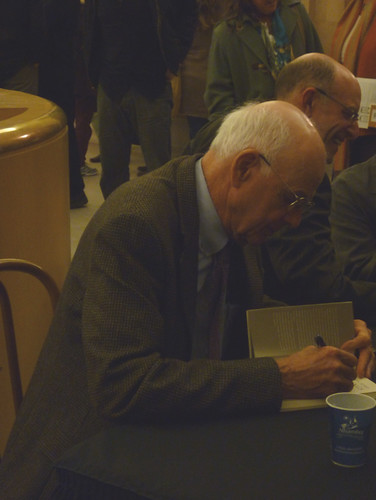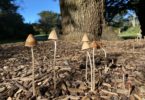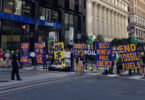Last night I had the great privilege to see and hear two of the most influential and inspiring figures in the sustainable food movement in conversation. While Michael Pollan has become a household name through books like Omnivore’s Dilemma, and most recently, films like Food Inc. and The Botany of Desire, he took the interviewer’s seat and gave the stage to a man who has touched so many of us who care about living in harmony with nature and whose prose about Americans’ relationship to their land has been as profound as it’s been prophetic.
This was Wendell Berry‘s night, the 75-year old agrarian, author and voice of stewardship who had traveled all the way from his Kentucky farm to share his eloquence, humor, and wisdom with an appreciative audience at the Herbst Theater in San Francisco. It’s impossible to list all the books, essays and poems Mr. Berry has written or to do justice in words to the impact he has had on the current renaissance of agrarian awakenings from budding farmers markets to a White House garden, so I will just relay some choice quotes that I hastily scribbled in the dark theater.
Wendell Berry is one of those rare souls whose mere presence brings you into a deeper place within yourself, a meditative zone that enables greater reflection and larger context, away from the constant soundbites we expose ourselves to in our daily lives. In an interview with Michael Krasny a day earlier, I was taken in by this simple thing he had to say:
Politics is the art of the practical.
Poetry is about enlarging the context.
While you have to fight the day to day battles of politics, he seems to say, you’ve got to take time to delve into the broader landscape of how these battles relate to the greater underlying themes and why you’re fighting them in the first place. When Michael Pollan introduced Mr. Berry, he asked us to take note of the pauses that would occur before each answer. “Here’s a man who thinks before he speaks,” he pointed out, “something most of us aren’t used to.”
The first question was about the new administration and its accomplishments after the first year. His answer I thought was very profound, a reminder to those of us losing patience with President Obama and forgetting that despite the power bestowed upon him he is a human being maneuvering through the morass of a deeply entrenched system built upon short-sightedness.
Imagine a mere person in that huge enterprise, so much of which is fraudulent.
He told us about his visit to the White House a couple of months ago, accompanying Wes Jackson to present and promote their 50 year farm bill to the President’s agricultural team. It seems pretty obvious that much of the trouble we’ve gotten ourselves into in regard to the food we grow and eat is based on the fact our farm bills only look 5 years into the future. Great for a corporate bottom line, but completely out of touch with the way mother earth functions. He pointed out that they were very well versed in the subject and receptive to the ideas presented, but as mentioned above, the realities of a political system that is so deeply rooted in instant gratification are hard to overcome in just a few months, years, or even a presidential term.
He did remind us of the tremendous impact of leadership that talks about the need for healthy fresh food, setting examples like having a garden on the White House lawn:
It’s an acknowledgement from the top that food exists before it gets on the plate.
And while a lot can be done working from the top down, Mr. Berry kept emphasizing that much of the needed work to restore our relationship with the land will have to and is already happening from the bottom up.
I’m not putting all my eggs in the political basket.
We’ll have real multiculturalism when we have local economies.
And speaking of economy, he had this to say:
I don’t believe in the bailing out of the paper economy.
This of course goes way beyond bailouts and stimuli or what the administration did or didn’t do in this recent crash, but it cuts right to a much bigger, systemic problem we have. The fact that very little of our economy has anything to do anymore with what we do with our hands and how we treat the land we live and depend on is testament how utterly disconnected we are from reality. Mr. Berry mentioned cities like Dallas, in the middle of vast ranch land, where people sit in big high rises pushing papers and looking at computer screens, feeding an imaginary economy that has nothing to do with the land they live on. He pointed out that our most revered expert economists like Paul Krugman don’t ever account for the impact we have on the land in their brainy, elaborate models, as if the food we eat and that keeps us nourished and alive is just a little leaf on the economy tree.
Nature’s wisdom as opposed to our cleverness.
It’s not just economists, but our society’s collective worship of brainy technology at the expense of listening to nature’s boundless wisdom. That sort of linear thinking that has brought us food-like substances concocted in scientific labs has drowned out our ability to listen to the rhythms of the land and be in sync with the nuances and complexities of the fragile yet incredibly resilient web of life. Mr. Berry used the example of how we say “this is not rocket science” as if to say that rocket science is the most complex thing on earth. It isn’t. The most complex and mysterious thing on earth is mother earth herself and her vast system of interconnectedness, and yet we’ve come to worship specialists who connect two dots and present it as a philosophy.
Farming doesn’t run on a universal solution. Farming runs on the best possible local solution.
The question about food grown in balance with the land as being too expensive and possibly elitist came up. The problem of course is that the industrially grown food is only so cheap because decades of subsidies for agribusiness and mono-crops have artificially cheapened our food, and we’ve become used to it, thinking it’s normal to only spend a fraction of our income on food. Mr. Berry said it pretty clearly:
Food is too cheap for everybody – that’s where the problem is.
And going a bit further into our fixation on short-term yield and profits, he said:
We’ve only given farmers a proxy to produce, but we haven’t given them a proxy to maintain the land.
Of course, many say that this doesn’t help the people who are too poor to afford good fresh food, and in some cases that’s true. But I also think that this has become a bit of a reflexive cop-out line, too. My partner and I buy a huge box of fresh vegetables directly from our local farmer for 25 bucks, and we munch on it for almost two weeks. I don’t think I could get as good a deal from Safeway, and that’s not even factoring the nutritional value of the food. Sure, a lot of people don’t have access to a local farmer, which is something that is rapidly changing though, with an explosion of farmer’s markets around the country. I guess my point is that real food doesn’t have to be more expensive than mass produced mono-crops and food-like substances. And don’t even get me started on the long term health costs. We need much more education, and we need to have a farm policy that supports small farmers and their land, not big profits.
Michael Pollan added a very important point about how we’ve been in this backwards cycle in the race for cheap and instant gratification, and how everyone has been forced to spiral down along with this economic model:
You pay people Walmart wages, and they can only afford Walmart food.
Amen, Michael.
The end of the conversation was truly magical, Wendell Berry at his very best. Asked about whether we have shifted too much of our environmental endeavors into preserving wilderness and not put enough of our thought and resources into preserving our farm land, he showed us the meaning of enlarging the context. You see, it’s only in our conditioned minds that we think of wilderness as only what’s inside a national park. If you ever dig your hands in the ground you’ll find an amazingly wild ecosystem right there underneath our feet.
There’s so much life in our soil. We have to maintain the wilderness beneath our feet in order to keep eating
He took it a step further, pointing out that only to us humans the wilderness is a wilderness. To all the creatures living in what we call wilderness it is their home, a living place, complexly domestic.
All the creatures in the wild are leading their domestic lives. The only wild things are humans, who are out of control.
And with that, a deeply moving and inspiring hour ended, leaving us all wonderfully nourished, our mental horizons opened and broadened.
As a special treat I got to snap a photo of these two soul brothers.









[…] doing what I’m doing. The interview was fantastic and spanned a whole slew of topics. Here is a good overview of what they talked about. If I were to write more about this it would take me […]
Reading this post again has re-inspired me to stop reading what I’m currently reading and spend time in Berry-land.
Yummy!
thanks for submitting this. I heard the live broadcast on KQED last night and I’m trying to transcribe or find the “title-less” poem he read at the end of his talk. I can’t recall being moved so powerfully as when I heard it. Now I’m trying to find it. Any suggestions?
Michael, I think I remember him saying that he had just written it, so it may not be published anywhere yet. If anything, it might have made it into his new book, but I don’t think so. He is definitely the kind of spirit who would take delight in tickling our souls like that, just cherishing the moment without giving us the chance to hang on to it. 🙂
Exactly… well said, he’s just brilliant. The piece about the
horses and their simplicity, similiar to his other thoughts on horses,
animal life, but it will surface and will read it over and over then.